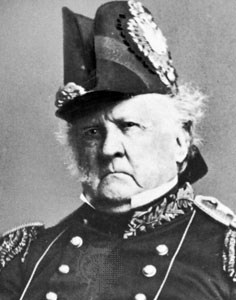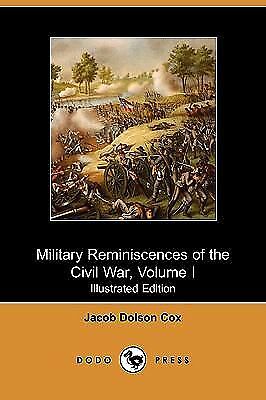One of the most important missteps taken by the Union as it faced the threat of secession was General-in-Chief Winfield Scott’s decision to create the U.S. Volunteers to parallel the U..S. army. He believed the war would be a short one, and he had had a negative experience with volunteers in the Mexican War. So his policy was that the regulars in the army could do all the fighting, while the volunteers could do guard duty, watch the borders, and act as auxiliaries. In fact, contrary to Scott’s vision, the 16,000 man army at the opening of the war would be “supplemented” by millions of volunteers, who would do the bulk of the fighting. (The South, by contrast, had a “unified army”).
Jacob Cox, one of the best Union “political generals,” opined in his memoirs that his soldiers were disgruntled because they not recognized as being in the United States army. He noted an additional problem was the “anomalous and hurtful” rivalry between West Point-trained Generals and Political Generals. The former, he wrote, often “refused to acknowledge the equality of the volunteers.” The latter, he wrote, saw the regular officers as “a would-be aristocracy and derided them as martinets.”
Over time, as the volunteers proved themselves, relations between the two groups improved, and volunteers like Cox, John Logan, and Joshua Chamberlain achieved both senior commands and recognition by the regulars as capable military leaders.
Cox believed that a “citizens army,” as Napoleon had created, would have been a far better approach. As he wrote, “If the regular army organization is so narrow it can’t be expanded in time of emergency, what use is it? If a volunteer organization is fit to decide the great wars of the nation, is it not ridiculous to keep an expensive organization of regulars f the petty contests with Indians?…what is needed is a system flexible enough to provide or the increase of the army to any size required without losing any of the advantage of character or efficiency which, in any respect, pertained to it as a regular army.”
Over time the U.S. armed forces have in fact evolved in this way, so Cox’s views were quite prescient. But the fact remains that some 98% of the Union army was not, oddly enough, in the Union army.
Below are images of Scott and Cox’s memoirs.



Very good analysis of the situation except; the volunteers received pensions and were included in the organization of “The Grand of the Republic” and received pensions. See my book “Always in the Middle Of The Battle for a history of one such unit, the First Illinois Artillery Battery D.
LikeLike
Very good points. But they only verify my point that eventually the regulars accepted that the volunteers could be capable soldiers. BUT the regulars would never have let the volunteer generals be army leaders — see Sherman’s refusal to give Logan command of the Army of Tennessee. I may do an added item and if so will site you for clarifying this important point. OK?
LikeLike